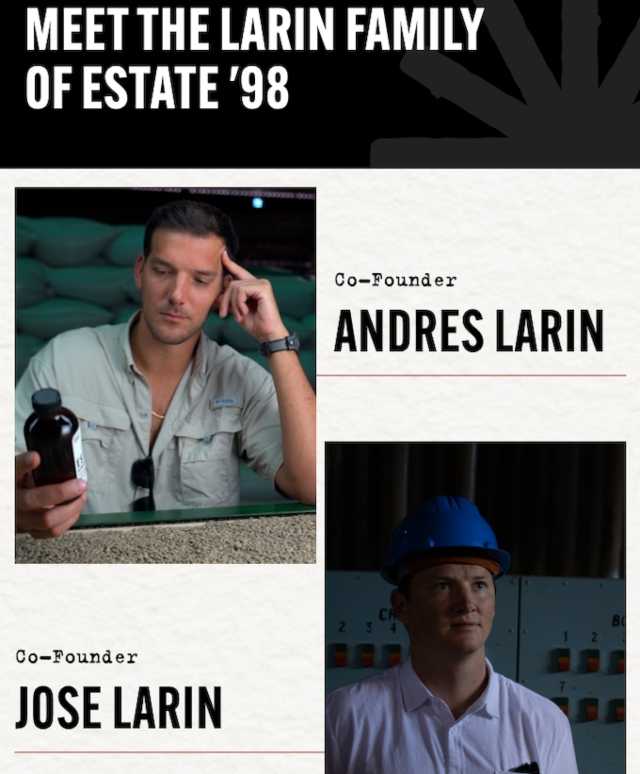MIAMI, Florida (USA) – Estate ‘98 Ultra-Concentrated Coffee is slowly changing the way people enjoy coffee through a time-honored recipe. The product is made from 100% Arabica beans (Bourbon varietal) that are shade-grown on volcanic soil and honey-processed in the lush mountains of El Salvador. In order to know more about the company we interviewed the Estate ‘98 co-founders Andres and Jose Larin.
What is the story behind Estate ’98?
“Our family was one of the pioneers of coffee in El Salvador, where they have been growing coffee in the mountainous region around the Santa Ana Volcano. Each generation of Larins has left their mark on the business and we wanted to leave ours by meshing old world traditions with innovation. As brothers, we always wanted to start a business together and the idea came to life when we learned about our ancestors who used to serve ‘Esencia de Cafe’ at the table in a cruet (vintage olive oil bottle), for a convenient cup of coffee. That’s when the idea was born.”
How is the recipe created? What is the traditional process behind it?
“We produce Estate ’98 with a method that extracts desirable compounds during the concentration to maintain flavor that is tested against a roasted bean, and rivals in flavor. The other key element is in the raw material. The coffee species, volcanic soil, elevation, microclimate, and our traditional process goes into the quality of the end product of our coffee. For our medium roast concentrate, we are using a single-estate 100% coffee bean that is honey processed and grown on rich volcanic soil in one of the best coffee regions in the world.
All of our coffee is picked and sorted by hand, and dried on patios versus modern machinery. It’s a very intensive process that is reflected in the flavor and notes of our extract. Coffee is like wine, and not all of it is created equal and it can be noted in our liquid concentrate.”
You mentioned you wanted to create a sustainable product mixing old traditions. What are your goals when it comes to sustainability?
“‘Esencia de cafe’ is an old-world concentrate that was common across El Salvador and Latin America as individuals back in the day didn’t have coffee shops or the wide array of brewing methods that we have today. In the present-day, millions of pounds of harmful plastics, pods and waste is created from coffee consumption, whereas our product eliminates all of that. Our bottle is 100% recyclable and produces up to 17 servings of coffee.
In addition, our shade-grown coffee protects natural ecosystems and local water supplies and is a biodiversity haven for thousands of birds and fauna.“
How would you say your product differentiates from the others?
“We are using some of the finest coffee available on the planet and we do not use any blends. Our concentrate is made using 100% Arabica beans and is a Bourbon varietal that is honey processed.”
Sustainability often comes with social projects. Do you have any programs that benefit the local cultures in El Salvador?
“We are currently working with the Salvadoran American Humanitarian Foundation and Murphs LIfe Foundation to initiate social projects for local farmers across the coffee regions of El Salvador. Our mission from day one has been about putting people first and we want to expand upon this as our company grows.”
You grew up learning the traditional coffee practices on their family’s farm in El Salvador and this is what makes Estate ’98 unique. Were they also inspired by USA culture? What is the main difference between El Salvador and Florida when it comes to coffee culture?
“El Salvador has quietly been producing the highest quality coffee for the last two centuries, and has had both a major political and economical impact with the United States. During the 1960’s it was the 4th largest producer of coffee in the world, with the United States being its largest customer. Most coffee drinkers don’t know about the intensive processes that go into a cup of high quality coffee and we wanted to bring that to light.
Coffee farmers, particularly small-scale producers in developing countries, often face difficulties due to volatile coffee prices and global market demand, along with agriculture challenges such as climate change, weather events, and pests disease. The income inequality between farmers and giant retailers such as Starbucks is enormous, and the ones impacted the most are the people working on the farms. We want to bridge that gap by increasing fair trade practices and relationships with El Salvadorian farmers and increasing social initiatives.”
What are your projects for the future?
“Our mission is to offer the most authentic, innovative, and high quality coffee experience and shed light on the people behind it. We are going to expand our product offerings that celebrate the culture and history of El Salvador. We are planning to partner with other farmers throughout El Salvador with the goal to return El Salvadoran coffee to the forefront of premium coffee.”
by Federico Adacher


















